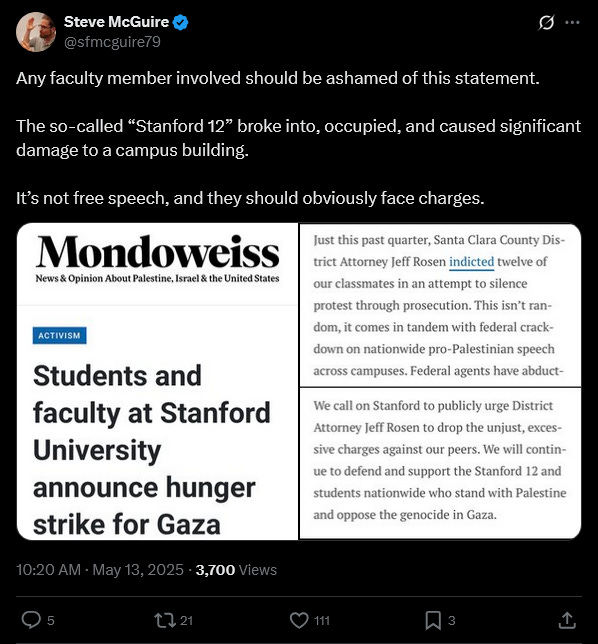E-Pluribus | May 14, 2025
Rumeysa Ozturk released; defunding NPR threatens free speech? Europe's growing censorship industry
A round-up of the latest and best musings on the rise of illiberalism in the public discourse:
Nate Raymond: Tufts student returns to Massachusetts after release from immigration custody
Pro-Palestinian activist and Tufts University student Rumeysa Ozturk was released Friday after spending nearly two months in an immigration detention center. Many First Amendment advocates have blasted the federal government for arresting her in the first place, arguing that she has every right to speak her mind about the ongoing war in Gaza. Reuters has the details:
Ozturk thanked her supporters, including professors and students who have sent her letters, and urged the public not to forget about hundreds of other women still housed in the detention center.
"America is the greatest democracy in the world," she said. "I have faith in the American system of justice."
The 30-year-old PhD student was arrested on March 25 by masked plainclothes officers on a street in the Boston suburb of Somerville, Massachusetts, near her home, after the U.S. Department of State revoked her student visa.
The sole basis authorities have provided for revoking her visa was an opinion piece she co-authored in Tufts' student newspaper criticizing the school's response to calls by students to divest from companies with ties to Israel and to "acknowledge the Palestinian genocide."
Her lawyers at the American Civil Liberties Union argued that her arrest and detention were unlawfully designed to punish her for speech protected by the U.S. Constitution's First Amendment and to chill the speech of others.
Mike Solana: Freedom of Leech
In recent weeks, we’ve highlighted several commentators who assert that the government is suppressing free speech by stripping universities and other institutions of their federal funding. At Pirate Wires, Mike Solana takes the other side of the argument, insisting that quasi-public outlets like NPR aren’t entitled to taxpayer dollars. They can still air and print whatever content they wish—they just have to reach an audience that will voluntarily pay for it:
The executive order to defund public broadcasting is “blatantly unlawful,” argued PBS CEO Paula Kerger. NPR’s Katherine Maher was more aggressive. This decision, she wrote, is “an affront to the First Amendment,” which gives us a pretty good sense of Washington’s next great “free speech” legal battle. The Washington Post helpfully explained the position that public broadcasters maintain a constitutionally-protected right to taxpayer money, flush with opinion from their “legal experts.”
…
What, you thought I just forgot about the Biden Administration’s attempt to institute a Ministry of Truth? NPR’s current CEO, the woman presently demanding federal funds for her media company on grounds revoking that funding violates the First Amendment, publicly bragged about coordinating with our government to censor information while she worked at the Wikimedia Foundation.
…
In the pantheon of “free speech” violations, this is all very different from what we were litigating under Biden, which generally concerned what private American citizens, and private American media companies, were allowed to say on private American speech platforms. And no court seemed to [care].
…
Hypocritical media breathlessness on the topic of free speech is legion. PBS, in its ongoing efforts to prove itself an unbiased source of news, published an incredible piece on the subject, in which the following incredible piece of language was employed: “First Amendment advocates say they’ve never seen freedom of speech under attack the way it has been in Trump’s second term.”
Really?
Really?
Not even that time the deep state quietly coordinated with every major speech platform in the country to censor Americans, for over half a decade, on every topic from Covid to “election integrity,” which all parties involved then lied about until the entire scheme was uncovered after Elon Musk bought Twitter?
Michael Shellenberger: Europe’s censorship industry is growing
In a long-form X post, Michael Shellenberger highlights an alarming trend in the European Union, where governments are actively arresting their own citizens for wrongthink, policing journalists and even trying to ban social media platforms. The good news? The US appears to be exerting a positive influence, challenging European officials for their censorious behavior. We’ve never been so proud to be Americans:
The UK is arresting 30 people per day for speech crimes. In Germany, 14 little-known state media agencies (SMAs) empowered by the 2020 “Media State Treaty” now monitor private journalists for compliance with vague “journalistic diligence” standards while exempting public broadcasters from the same scrutiny. French authorities want mandatory digital identification for users of social media platforms. The European Commission appears to desire the power to ban or censor whole platforms, particularly Elon Musk’s X. And an Irish newspaper this week reported that the European Commission accused Ireland of “failing” to comply with laws regulating hate speech.
The wind remains at the back of free speech lovers. The change of government in the U.S. is already influencing Europe, where officials appear to be reconsidering some of the most aggressive censorship policies. In the UK, American negotiators have raised concerns about free speech tied to the Online Safety Act. At the same time, in the EU, the Digital Services Act enforcement faces legal and logistical delays. France has drawn criticism for prosecuting satirical speech, and in Germany, a CBS 60 Minutes segment has fueled backlash against selective speech policing.
Meanwhile, some in Brussels worry that the EU’s growing alignment with censorship risks its credibility as a champion of liberal democracy. Even so, there is reason to be alarmed by what’s happening in Europe, says the Foundation for Freedom Online’s Mike Benz. “The most existential threats are now shifting around the international landscape and how that boomerangs back to the U.S.,” he said in a new podcast. American censorship leaders are working with European governments and NGOs to impose European censorship on social media platforms.
Around X
The US government has mislabeled far too many college protestors as terrorist sympathizers in recent months. Nevertheless, there are indeed cases of students trespassing and destroying property. Steve McGuire says such behavior isn’t constitutionally protected, though it definitely deserves to be prosecuted.
Never mind college students. New York Post columnist Rikki Schlott recounts the story of fifth graders who were punished because of their parents’ apparently unacceptable politics.
North of the border, Canada’s new government is declaring war on platforms that promote “hate speech.” Colin Wright calls this what it really is: mass censorship.









I don’t understand America doesn’t have a right to refuse foreigners from our country and deport them? No, not buying that. No foreigner has an inalienable right to this country.